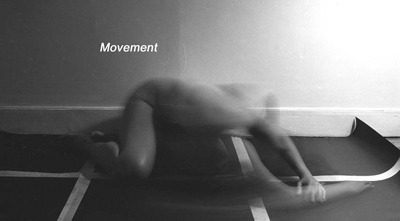|
||
| The getting-out-of-bed feeling, that picking-up
of oneself, that transition from rest into movement. Some days, when I'm
late or stressed -jump-up- I miss it completely, other days it's a slow
climb through the arms of a lover, and still other days it is arduously
stretched out across a series of snooze alarms. It's not that this morning
moment is particularly reflective, but in that wake-up moment, silently,
as each cell comes to life, questions awake with me: What will I do? What
do I need to accomplish? How? Why? Why not?… And in the friction between
the dream and the day, movement, and its lack, are palpable.
Jen Hui Bon Hoa's photograph "Lying" captures this sensation of rising-up. The body is stretched between sleep and awake. Still not fully swept into the tasks of the day, still heavy within itself, the body dallies and slowly glides through the arc of its own movement. The feeling of awaking, of activation, of coming-to, so tangible in "Lying", can be taken as a metaphor through which to read Movement. The collection of works compiled here in Movement address varying aspects of the nature of movement: political movements, existential movement, psychoanalytic drives, transcendence and repetition, and teleology. In keeping with the interdisciplinary mandate of j_spot: journal of social and political thought, the collected papers span a wide range of disciplines: literature and literary criticism, psychoanalysis, pop-culture analysis, political theory, and philosophy. Jeffrey L. Coleman's "Michael S. Harper's "Here Where Coltrane Is" and Coltrane's "Alabama": The Social/Aesthetic Intersections of Civil Rights Movement Poetry", demonstrates the importance of poetry to the American Civil Rights Movement. Coleman's analysis of poetry in the Civil Rights movement considers poetry and its capacity to function within a large-scale political movement; his poems, in contrast, offer a meditation on the movement that occurs, still politically, though on a smaller-scale, between individual people. James Gifford's "What is Zizek So Afraid Of? Movement Against the Existential Hordes, questions what motivates human existence. Arguing via Terror Management Theory that it is through the fear of death that we call-up our very existence, Gifford challenges Zizek's use of the traditional psychoanalytic contention that we are compelled to move towards death. Lars Iyers' "The Movement of Testimony: Affliction in Blanchot and Antelme", is focused on Blanchot's reading of Antelme's holocaust memoir, The Human Race. Through Blanchot and Levinas, Iyers questions the notion of repetition, and asks if transcendence can be a simple will to move? Iyers argues that we must acknowledge our inescapable burdens, and asks how, with the weight of this burden, we are to move towards the possibilities of the future. Finally, my "Dreaming, Mourning, Working: The Role of Teleology in Early Twentieth Century Marxism", taking-up the work of Ernst Bloch, Georg Lukacs, and Walter Benjamin, searches for a mode of conceptualizing teleology that can negotiate the terrain in between the culpability of instrumental rationality, and the paralysis of a complete a-teleology. In addition to these papers, Movement presents a collection of special invitation pieces. Motion's poetry, a voice of urban black women, is an articulation of a political move towards self-empowerment. Caitlin Fisher designed the multi-media selection from Nancy Nicol's "Stand Together". Nicol's film documents the struggles, obstacles, and successes of the gay and lesbian liberation movement in Ontario, Canada. Mike Palamarek's translation of the der Spiegel interview presents Bourdieu's thoughts on the shortcomings, illusions, and opportunities of the global protest movement, expressed through the specific circumstances of the protests at the G8 summit in Genoa in 2001. David McNally's "Democracy Against Capitalism: The Revolt of the Dispossessed", broaches the dire position of democracy under capitalism, presents a series of radical movements and their struggles for democracy, and argues that the negative act of say "No" is a crucial beginning, one that cannot stand on its own, but must involve the positive search for a radically new society. These invited pieces are impressive accomplishments in their various fields; we are most fortunate to be able to include them in Movement. Initiallly the idea to do a j_spot issue on the theme of movement was inspired by Martin Luther King Jr's words: "The thing that we are challenged to do is to keep this movement moving....Inspite of the difficulties, and we're going to have a few more difficulties. Keep climbing. Keep moving. If you can't fly, run. If you can't run, walk. If you can't walk, crawl. But whatever you do, keep moving." Now as I put this issue to bed, I find myself returning to the words of MLK, and althought the issue is much different than I had anticipated, his words remain important to my understanding of Movement. Kathy Walker |
